Maternal and Child Health Related Grants
DSHS Maternal and Child Health Services Block Grant is a Federal-State partnership program managed by the Maternal and Child Health Section (MCHS). This block grant was authorized under Title V of the Social Security Act (SSA) and is one of the largest federal block grant programs. The program functions as a key resource in supporting pregnant women, mothers, and children’s health and well-being.
Maternal and child health related grants are used to assist various systems of care for maternal and child populations, including vulnerable populations who are without access to adequate health care. Funds are often used in services to assure access to quality health care for mothers and children, reduce infant mortality, increase screenings of children, implement systems of coordinated care for children with special health care needs, and assist pregnant women with Medicaid applications.
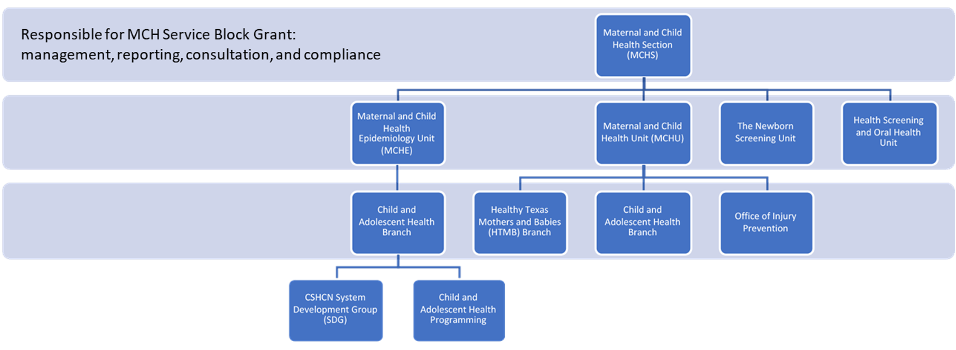
Health Resources and Services Administration (HRSA) categorizes the funding for Maternal and Child Health programs according to the following five sources:
| Sources | Definitions |
|---|---|
| Federal allocation | The funds that a state receives from the federal government |
| Local MCH funds | The funds from local jurisdictions within a state |
| Other funds | The funds include, but are not limited to, funds from the Centers for Disease Control and Prevention (CDC); Emergency Medical Services for Children (EMSC); Healthy Start; and the Special Supplemental Nutrition Program for Women, Infants and Children (WIC) |
| Program income funds | The funds that are collected by state maternal and child health agencies that include health maintenance organization (HMO) payments, insurance payments, and Medicaid reimbursements |
| State MCH funds | The funds that states match to their federal allocations. States are required to match at least $3 for every $4 given by the federal government |

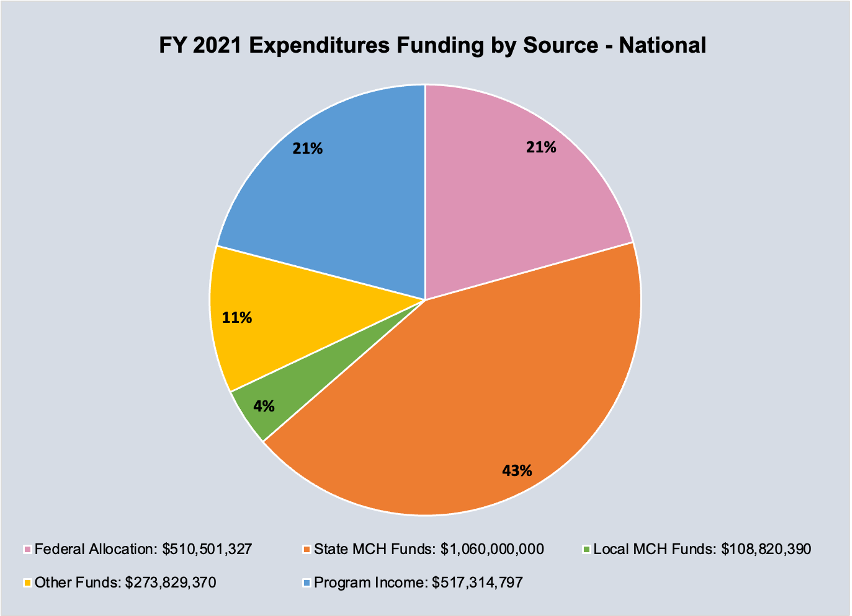
Source: U.S. Department of Health and Human Services
ALN Number 93.994 Maternal and Child Health Grants have provided total assistance of $5,492,733,743 (about $17 per person in the US) (about $17 per person in the US) since 2018 (The Tracking Accountability in Government Grants System (TAGGS)). According to the Health Resources & Services Administration (HRSA), “In 2019, the Maternal and Child Health Block Grant Program funded 59 states and jurisdictions to provide health care and public health services for an estimated 60 million people. Services reached 92% of all pregnant women, 98% of infants, and 60% of children nationwide, including children with special health care needs.”
*Assistance Listing Numbers (ALN), formerly the Catalog of Federal Domestic Assistance (CFDA).
Categories of individuals that the grant benefitted and the scope of services (PDF)
Every year, Congress will set funding for this grant, and individual states use a formula to determine the allotments. The formula is based on a comparison of the proportion of low-income children in an individual state to the total number of low-income children in the U.S. At the local level, states and jurisdictions are required to match the federal funds, but most of the time, the states exceed the minimum matching requirement (overmatch).
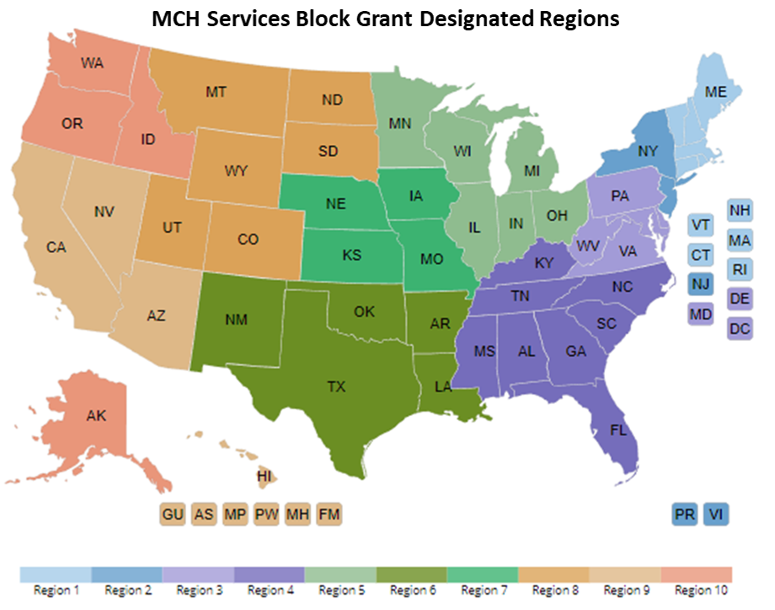
Source: Maternal and Child Health Services Block Grant: Background and Funding
For example, Region 6 (AR, LA, NM, OK, TX)’s budget and expenditure funding chart, shown below, is in line with the national figures. The state MCH program provides the most funds because of the overmatch. Therefore, there is more funding available each year for the program.
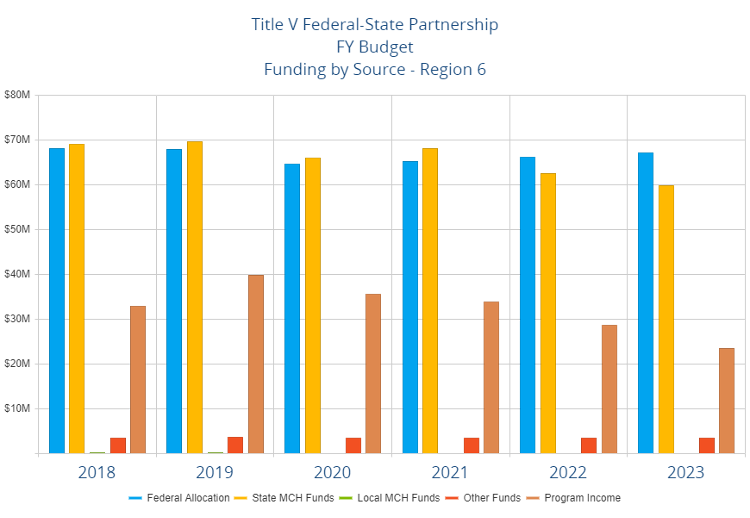
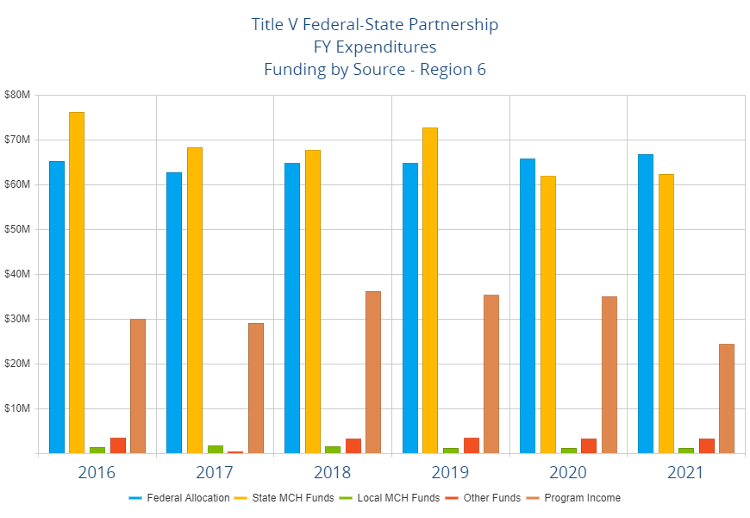
Source: U.S. Department of Health and Human Services
Federal Reporting Requirements
There are three mandatory reporting mechanisms at both the state and national levels:
Needs Assessment
Must be performed every five years
Annual Report
Must include program participation data, state maternal and child health measures, and state pediatric and family workforce measures
Independent Audit
Must be performed every two years
Source: Maternal and Child Health Services Block Grant: Background and Funding
DSHS Reporting Requirements
Reporting for fund disbursement:
- The System Agency will reimburse the allowable costs incurred in performing the Project scope of work. The costs must be sufficiently documented.
- Grantees can submit requests for monthly reimbursement using the State of Texas Purchase Voucher (Form B-13).
- Grantees will be paid on a cost-reimbursement basis and in accordance with the Budget.
Monitoring for fund validation:
- DSHS will monitor Grantee’s expenditures on a quarterly basis
Audit Requirement:
- If the expenditure thresholds were met, the grantee must have a single audit or program-specific audit; otherwise, each grantee must provide financial statements.
| Audits | Financial Statements | ||
|---|---|---|---|
| Documents | Single Audit Determination Form | ||
| Deadline | within thirty (30) calendar days after receipt of notice | no later than nine months after the Grantee's fiscal year end | |
| Expenditure Thresholds | at least $750,000 | Less than $750,000 | |
| Funding Level | federal funds awarded | state funds awarded | |
| Applicable Rules | 2 CFR 200 | UGMS, State of Texas Single Audit Circular | |
Applicable cost principles, audit requirements, and administrative requirements include, but are not limited to:
| Applicable Entity | Applicable Cost Principles | Audit Requirements | Administrative Requirements |
|---|---|---|---|
| State, Local and Tribal Governments | 2 CFR, Part 225 | 2 CFR Part 200, Subpart F and UGMS | 2 CFR Part 200 and UGMS |
| Educational Institutions | 2 CFR, Part 220 | 2 CFR Part 200, Subpart F and UGMS | 2 CFR Part 200 and UGMS |
| Non-Profit Organizations | 2 CFR, Part 230 | 2 CFR Part 200, Subpart F and UGMS | 2 CFR Part 200 and UGMS |
| For-profit Organization other than a hospital and an organization named in OMB Circular A-122 (2 CFR Part, 230) as not subject to that circular | 48 CFR Part 31, Contract Cost Principles Procedures, or uniform cost accounting standards that comply with cost principles acceptable to the federal or state awarding agency | 2 CFR Part 200, Subpart F and UGMS | 2 CFR Part 200 and UGMS |